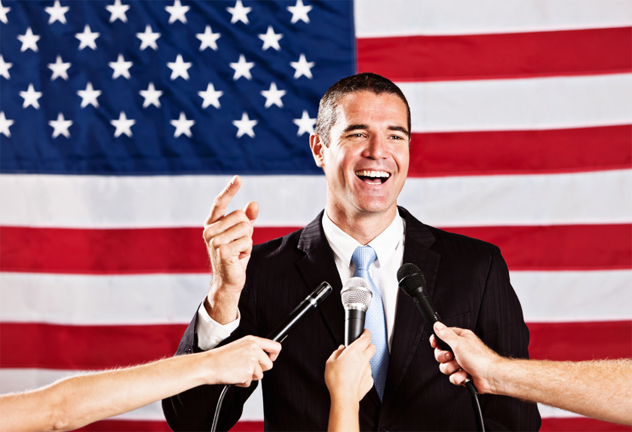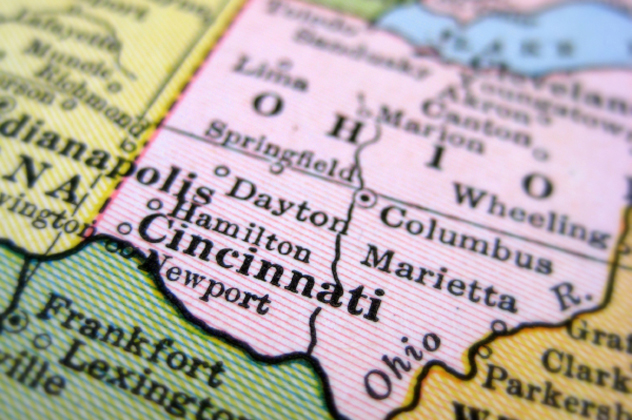 Miscellaneous
Miscellaneous  Miscellaneous
Miscellaneous  Politics
Politics 10 Lesser-Known Far-Right Groups of the 21st Century
 History
History Ten Revealing Facts about Daily Domestic Life in the Old West
 Weird Stuff
Weird Stuff 10 Everyday Products Surprisingly Made by Inmates
 Movies and TV
Movies and TV 10 Actors Dragged out of Retirement for One Key Role
 Creepy
Creepy 10 Lesser-Known Shapeshifter Legends from Around the World
 Animals
Animals 10 Amazing Animal Tales from the Ancient World
 Gaming
Gaming 10 Game Characters Everyone Hated Playing
 Books
Books 10 Famous Writers Who Were Hypocritical
 Humans
Humans 10 of the World’s Toughest Puzzles Solved in Record Time
 Miscellaneous
Miscellaneous 10 Ironic News Stories Straight out of an Alanis Morissette Song
 Politics
Politics 10 Lesser-Known Far-Right Groups of the 21st Century
 History
History Ten Revealing Facts about Daily Domestic Life in the Old West
Who's Behind Listverse?

Jamie Frater
Head Editor
Jamie founded Listverse due to an insatiable desire to share fascinating, obscure, and bizarre facts. He has been a guest speaker on numerous national radio and television stations and is a five time published author.
More About Us Weird Stuff
Weird Stuff 10 Everyday Products Surprisingly Made by Inmates
 Movies and TV
Movies and TV 10 Actors Dragged out of Retirement for One Key Role
 Creepy
Creepy 10 Lesser-Known Shapeshifter Legends from Around the World
 Animals
Animals 10 Amazing Animal Tales from the Ancient World
 Gaming
Gaming 10 Game Characters Everyone Hated Playing
 Books
Books 10 Famous Writers Who Were Hypocritical
 Humans
Humans 10 of the World’s Toughest Puzzles Solved in Record Time
10 (Safe-For-Work) Facts About Swearing
Everyone swears, and everyone has their favorite go-to words for people they don’t like or things that go wrong. It’s such a common part of human nature that many of us don’t think twice about doing it—until we’re caught by an older relative. And as it turns out, the neurobiology, history, and psychology behind swearing are just as fascinating as the seemingly endless flavors of swearing itself.
10It’s Legitimate Pain Relief

Swearing and pain are invariably linked. Stub your toe in the dark or slam your finger in the car door, and the first thing that comes out of your mouth is likely to be something that once would have gotten you in trouble with your mother.
There’s a reason for that. A study from Keele University found that swearing acts as legitimate pain relief. Dr. Richard Stephen of Keele’s psychology department recruited 64 volunteers to see how long they could tolerate pain with and without swearing. The whole thing came about after Stephen was in the delivery room with his wife, who used what he described as a rather impressive string of expletives during her painful labor.
To simulate pain, Stephen had the volunteers hold their hands in ice water as long as they could. Some were told to swear while others weren’t. Across the board, the group that was encouraged to swear not only kept their hands in the water longer, but they also reported that it was less painful than the other group.
Stephen’s team also looked at whether or not the effects of swearing as pain relief had anything to do with how often people swore on a daily basis. Those who admitted to swearing a lot had the pain reduction effect of swearing somewhat lessened, suggesting that they’d become so habituated to swearing that it no longer had the emotional, adrenaline-fueled reaction that allowed others to tolerate more pain. The researchers determined that swearing was a trigger for a fight-or-flight response that allowed people to steel themselves against pain more successfully, something that was also demonstrated by Stephen Fry and Brian Blessed on Fry’s Planet Word.
9John Taylor: Convicted Blasphemer

Words become labeled as swear words because they refer to something taboo. In the 1600s, there was little that was more taboo than blasphemy, and it’s still at the root of a lot of the words that are off-limits in polite company today. In 1676, an Englishman named John Taylor was dragged before the Westminster court as an example of how dangerous blasphemy could be.
The text from his indictment still exists, and it’s pretty inflammatory for the time. When Taylor had his day in court, it was—unfortunately for him—at the same time the courts were trying to write up a bill that would regulate not just blasphemy, but profanity as well.
Taylor’s words were so unthinkable that he was first committed to Bedlam to see if he was merely a blasphemer or outright mad. When treatment at Bedlam didn’t help drive out the blasphemy, he was ordered to appear in court again.
Sadly, the records of what happened in court are gone, but we do have pieces of eyewitness accounts saying that there was no doubt about what Taylor actually said, as he proudly repeated his beliefs for all the court to hear. When he tried to explain what he really meant by his words and insisted that they weren’t blasphemous at all, the court didn’t buy it.
The Lord Chief Justice went on to not only pass sentence, but to establish this very type of swearing as a crime punishable by a court of law. To speak against the church was to speak against the very core of that nation’s belief, and that made blasphemy a state matter. Taylor was sentenced to pay a hefty fine. Then he had to stand in first the Westminster pillory and then the Guildford pillory while wearing a piece of paper stuck to his head that read, “For blasphemous words, tending to the subversion of all government.” He was then to be imprisoned until he could find someone to vouch for his good behavior. There is no record of him being released.
8We Love Politicians Who Swear

Politicians are a different breed than the rest of us, and a lot of their campaigning efforts are targeted toward everyday people. According to a study by Nicoletta Cavazza that was published in the Journal of Language and Social Psychology, there’s an easy way for politicians to be more relatable: swear.
The study had more than 100 people read a blog post by an imaginary candidate for an imaginary election. If the post (which was written by the researchers and focused on unemployment) contained some minor vulgarities sprinkled throughout, participants reported that they were not only more likely to vote for that person, but their overall opinion of them was higher.
Using vulgar language is usually something that’s acceptable only in more informal settings, and when politicians do it, they’re bypassing the usual “holier-than-thou” status that most carry themselves with. It makes them easier to relate to. Swearing is an emotional thing, and when politicians do it, it suggests that they understand where their constituents are coming from.
It only works for men, though. The study found that when a female politician swore, it didn’t raise or lower her rating. The researchers had actually expected swearing to have a detrimental effect on how people viewed her, which would have been more in line with gender role expectations.
They also aren’t sure if there is a limit to how much a politician can swear before it becomes detrimental to their campaign.
7America’s Most Obscene State

Ever call a company to be greeted with a recorded message that says you’re being recorded for “quality assurance?” Ever wonder if those recordings are ever used?
They are. In 2013, the ad firm Marchex went through more than 600,000 customer service calls from the previous year. The calls spanned 30 different types of businesses from across the US. Marchex was looking for two things: swearing and politeness. Once they compiled all the data, they ranked US states based on how rude they were.
If you think New Yorkers came in at the top of the list for most vulgar, you’d be completely wrong. They ranked somewhere in the middle, with a designation of “Occasionally Profane.”
Ohio, on the other hand, needs to have its collective mouth washed out with industrial-strength soap.
The Buckeye State came first in the “Sailors” category, and it also ranked in the top five for the “Least Courteous” states. (Rounding out that category were Tennessee, Indiana, Massachusetts, and Wisconsin.) Joining Ohio in the aptly named “Sailors” category were Maryland, New Jersey, Louisiana, and Illinois, while the least likely to swear were people from Washington, DC.
They also found that about 66 percent of the swearing on customer service calls came from men and that calls made in the morning were about twice as likely to contain some R-rated language. Most of the curse-laden calls also lasted more than 10 minutes, time taken either solving the problem or keeping people on hold.
When a Ukrainian firm scoured data from Twitter for similar patterns, they found that they could create a heat map of the places in the US with the worst language. They flagged certain words and monitored Twitter from July 14–24, 2012. They found that while there were high concentrations of swearing in New York City and Los Angeles (which also have higher population densities), there was also a big blur centered right over the entire state of Ohio.
6Swearing In A Second Language

While some swear words are so overused that they don’t mean much any more, there are still some that pack a punch. These are the words that you feel as well as hear, and it seems as though our brains have a built-in defense mechanism against rude words in something other than our native tongue.
In a study that tried to see if our brains could separate meaning from emotion, psychologists at Bangor University in the UK looked at how people fluent in both Chinese and English processed swear words. They took three groups: one group of native English speakers, one group of native Chinese speakers, and one group of native Chinese speakers who had learned English as a second language before they were teenagers.
The volunteers were presented with pairs of words—one with a neutral connotation and the other with a connotation that was either neutral, positive, or negative. If the words were connected, they were told to push a button while their brain activity was monitored.
Brain activity showed that when bilingual people read words in their second language, they were translating the positive and the neutral words, but not the negative ones, suggesting that there’s a built-in switch that the brain can flip to distance itself from unpleasantness in another language.
That goes along with the findings of a study from the University of Warsaw, which looked at how bilingual people swore. They found that most people preferred to swear in anything but their native language. Since language is a very emotional thing, the study suggests that we have an emotional connection to our first language that isn’t there with the second.
The effect was magnified when the study got down to some of the dirtiest of swear words: racial and ethnic slurs. There, the volunteers tended to amplify the strength of their terms when they were speaking in their second language.
5Swearing And Intelligence

It’s a common misconception that people who swear a lot only do so because they don’t have the vocabulary to express themselves in a more acceptable way. But science says that the opposite is true.
Psychologists from Marist College and the Massachusetts College of Liberal Arts theorized that anyone who has a wide vocabulary when it comes to rude words is likely to have a wide vocabulary for other words, too. To test the theory, they set up a couple of experiments.
One took 43 volunteers and asked them to first name as many swear words as they could in 60 seconds, followed by the challenge of naming as many animals as they could in the same amount of time. A second experiment had the volunteers doing much the same, only writing down their answers.
They found that the people who could name more cuss words did better on the other parts of the test as well. There was a direct correlation between the number of rude words they could name and how wide the rest of their vocabulary was.
4My First Swear

It’s a moment that most parents dread—the first time the little one blurts out the swear words they overheard from the backseat. According to psychology professor Timothy Jay (the same professor who conducted the experiment on the association between swearing and vocabulary), children aren’t just swearing more often today than they were 20 years ago, but they’re picking it up sooner, too.
Jay says that today, most kids are picking up swearing well before they head off to school—the place where previous generations learned all their rude words. He chalks that up to a few things, including this generation of parents tending toward the more hypocritical side when it comes to telling their kids not to swear while doing it themselves. It also has to do with the sheer volume of swear words that make their way into today’s conversations. On average, anywhere from 0.3 to 0.7 percent of the words we utter each day falls into the realm of swearing.
Now, most kids are cursing away by the time they’re two years old, which means they’re learning to swear at the same time they learn other words. The tykes might not know what the words mean, but we all know how unforgiving the relentless little parrots can be when they’re imitating new sounds. Swearing stands out to kids as much as it does to adults, and while some might keep repeating it because they like the attention they get, others might just like the way that sounds.
3Brain Function And Tourette’s

For all the advances we’ve made in medicine, we still don’t know a lot about Tourette’s. The condition is thought to be genetic and may have something to do with a defect in the basal ganglia. It causes tics that can vary widely, even among members of the same family, and one of the most famous of the tics is coprolalia, or swearing.
So that begs the question: Why swearing? Why do a small percentage of Tourette’s sufferers blurt out obscenities and not, say, quotes from Star Wars or annoying advertising jingles?
It likely has something to do with the way the brain processes swear words. Just like we consciously recognize them as something different than ordinary language, our subconscious seems to do the same thing. It segregates bad words into something akin to the time-out corner of the brain, but how this all works remains something of a mystery.
Work that’s been done with people suffering from aphasia backs up the idea that there’s a special place in the brain for swear words. Aphasia is defined as a loss of language skills, and it usually occurs in people who are suffering from dementia or who have sustained some sort of brain damage. While they lose a major part of their vocabulary, one group of words that’s often completely unaffected by the loss is their ability to swear.
Also in favor of the idea of a separate storage facility for swear words is our ability to learn them faster than regular words. We’ve talked about how quickly kids can pick up swear words, and the same thing happens when we start learning another language. Know any words in a language other than the ones you’re fluent in?
There might be a “bathroom, please” in there, but we’re willing to be some of them are swear words. Aren’t they?
The same patterns aren’t just found in English—they’re found across the board. This suggests that we file our bad words in the deepest brain regions we have, the regions that are the hardiest and the most primal.
2Swearing As A Diagnostic Tool

There are plenty of things that can go wrong with our minds as we age. Frankly, it’s all pretty terrifying stuff. Even more terrifying is the idea that some disorders are still difficult to diagnose, even with today’s medical technology. For example, it’s next to impossible to tell the difference between Alzheimer’s and a condition called frontotemporal dementia. Symptoms are very similar, but the treatment for one won’t work for the other. To combat this, doctors have started looking at swearing as a diagnostic tool, especially in the conditions’ early stages.
Language is one of the telling factors in diagnosing a number of different brain disorders, and testing a person’s recall and verbal fluency can give hints as to what’s going on in the deepest corners of that person’s brain. Patients are often asked to recite as many words as they can in a particular category, which helps doctors determine what part of the brain has been compromised.
In one study, doctors asked patients to recite as many words as they could that started with letters “F,” “A,” and “S”—giving it the more specific name of FAS testing. Patients diagnosed with frontotemporal dementia (FTD) were much more likely to drop a few swear words into their lists, particularly during the “F” section of the test.
On the other hand, none of the study’s Alzheimer’s sufferers included the most famous swear word in the “F” section of their testing.
Those with FTD were found to produce fewer words overall, and researchers aren’t sure why they were more likely to swear. It might have something to do with the way the brain processes words and what parts have been damaged by disease, or it might have something to do with a loss of inhibition and control over certain kinds of behaviors.
1The Most Unfortunately Named Defendant

Tracing the roots of today’s words can be fun, and it’s even more fun when we look at swear words. When Paul Booth of Keele University was digging through court records from 1310, he came across what’s currently the oldest known use of a word that we’re all familiar with: the F-bomb. Previously, the earliest known use was from the 15th century, making Roger Fuckebythenavele something of a trend-setter.
Booth is pretty sure that wasn’t the guy’s real name. It was more likely an insulting name for a less-than-honorable bloke who was dragged before the courts on a charge that was severe enough for him to be outlawed. (The next step after banishment was execution, so they weren’t playing around.) Booth says that even in 1310 it probably meant exactly what you think it means today. His own nickname for poor old Roger is the “Inexperienced Copulator.” Booth isn’t certain whether it was a commonly used insult or simply part of the claims that had been brought up in court.
There’s also some awesome early evidence for use of the word as a place name. A Bristol charter from 1373 refers to a field named Fockynggroue. Its meaning becomes pretty clear when you swap out the letters from Middle English to modern, but we have no idea why anyone felt it necessary to name a place that. The name was never elaborated on, but it stuck around until about 1900, when a publication disappointingly referred to it as Pucking Grove.
Whatever the reason for the name, it indicates that we know less about where our most vitriolic words come from than we thought. Until these early English discoveries, the root was thought to be Scandinavian, and the earliest occurrence was thought to be in the 16th century.
So next time you find some R-rated words crossing your lips, rest assured that you’re in ancient company.








